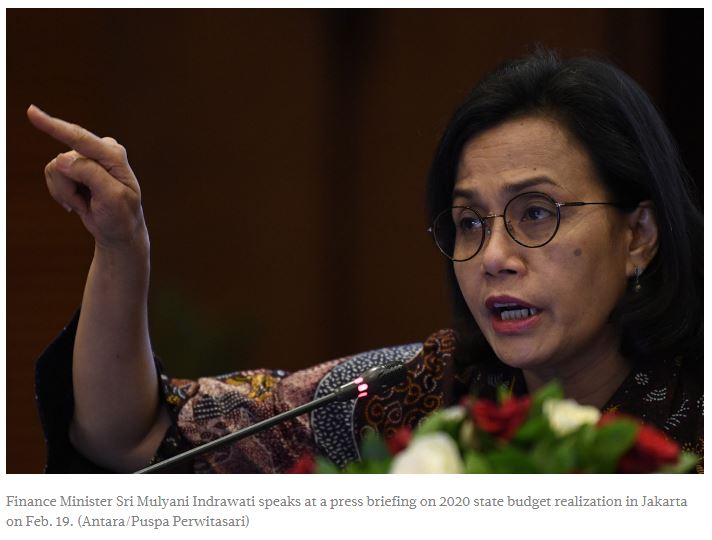Indonesia records $17.5b budget deficit in H1 as govt seeks to bolster spending
Indonesia recorded a Rp 257.8 trillion (US$17.5 billion) budget deficit in the first half of the year as the government seeks to bolster stimulus spending to cushion the coronavirus-battered economy.
The deficit amounts to 1.57 percent of the country’s gross domestic product (GDP), the highest half-yearly deficit recorded since the first half of 2016 but still below the government’s expectation of 6.34 percent this year.
“We are planning to accelerate state spending in this year’s second half to manage the COVID-19 pandemic and bolster economic recovery,” Finance Minister Sri Mulyani Indrawati told reporters in a press briefing on Monday. “We will use our fiscal tools to minimize the negative impact of the pandemic and reduce the people’s burden to help them recover.”
The government is working to accelerate the disbursement of a Rp 695.2 trillion stimulus package to boost the cooling economy and strengthen the healthcare system after criticism from President Joko “Jokowi” Widodo as well as from business and health communities for the slow action.
While government spending accounts for less than 10 percent of Indonesia’s GDP, it has a multiplier effect on various components of the economy, such as household spending and investment, as social aid can boost purchasing power, while government spending on goods and services helps support demand for businesses, among other factors.
According to the Finance Ministry, state spending totaled Rp 1.06 quadrillion in the first half, a 3.3 percent increase compared to the same period last year and equal to 39 percent of this year’s target. Central government spending rose 6 percent year-on-year (yoy) to Rp 668.5 trillion, equal to 33 percent of the year’s target, as social and capital expenditure rose significantly.
Meanwhile, state income totaled just Rp 811.2 trillion in the first half of the year, a drop of 9.8 percent, due to falling tax revenue as the pandemic hit numerous sectors of the economy and slumping nontax income due to a drop in commodity prices. State income in the first half accounted for 47.7 percent of the year’s target.
Almost all sectors of the economy, including manufacturing, trade and construction, paid more in taxes in June than the previous month following the gradual reopening of the economy, the ministry’s data showed, signalling improving economic activity after more than three months of partial lockdown to curb the virus spread.
Indonesia surpassed China in its total number of COVID-19 cases on Saturday and logged the highest daily death toll on Sunday as the economy reopens.
The government is now working on a plan to provide cash transfers to serve as working capital directly for micro, small and medium enterprises (MSMEs) that have yet to receive financing access from banks in a bid to help them survive the pandemic, Sri Mulyani said, adding that Jokowi would announce the plan in the coming weeks.
“We are also expanding the social protection stimulus until December to stimulate the demand side, as well as expanding incentives for medical workers until the end of the year,” Sri Mulyani said, stressing that the government aimed to provide assurance amid the pandemic.
The government expects the economy to shrink 0.4 percent at worst or grow 1 percent at best, with second quarter growth expected to shrink 3.54 to 5.08 percent, the finance minister added.
Bank Indonesia has forecast a U-shaped recovery, instead of the previous V-shaped recovery projection, for the country’s economy as the coronavirus pandemic took a greater toll than previously expected. The central bank expects GDP to deeply contract by between 4 and 4.8 percent in the second quarter.
“The work now begins for the government to spend the stimulus to bolster the economy,” Center of Reform on Economics (Core) Indonesia research director Piter Abdullah told The Jakarta Post on Tuesday. “The national economic recovery program will prevent a deeper economic contraction if the government moves fast enough.”
Source: https://www.thejakartapost.com/news/2020/07/21/indonesia-records-17-5b-budget-deficit-in-h1-as-govt-seeks-to-bolster-spending.html


 English
English




